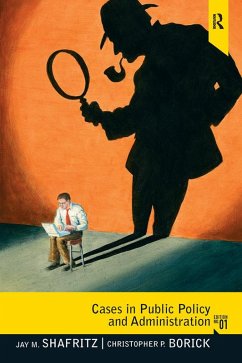Jay M. Shafritz, Christopher P. Borick
Cases in Public Policy and Administration (eBook, PDF)
From Ancient Times to the Present
55,95 €
55,95 €
inkl. MwSt.
Sofort per Download lieferbar

28 °P sammeln
55,95 €
Als Download kaufen

55,95 €
inkl. MwSt.
Sofort per Download lieferbar

28 °P sammeln
Jetzt verschenken
Alle Infos zum eBook verschenken
55,95 €
inkl. MwSt.
Sofort per Download lieferbar
Alle Infos zum eBook verschenken

28 °P sammeln
Jay M. Shafritz, Christopher P. Borick
Cases in Public Policy and Administration (eBook, PDF)
From Ancient Times to the Present
- Format: PDF
- Merkliste
- Auf die Merkliste
- Bewerten Bewerten
- Teilen
- Produkt teilen
- Produkterinnerung
- Produkterinnerung

Bitte loggen Sie sich zunächst in Ihr Kundenkonto ein oder registrieren Sie sich bei
bücher.de, um das eBook-Abo tolino select nutzen zu können.
Hier können Sie sich einloggen
Hier können Sie sich einloggen
Sie sind bereits eingeloggt. Klicken Sie auf 2. tolino select Abo, um fortzufahren.

Bitte loggen Sie sich zunächst in Ihr Kundenkonto ein oder registrieren Sie sich bei bücher.de, um das eBook-Abo tolino select nutzen zu können.
Writing the perfect complement to their bestseller, Introducing Public Administration , Shafritz and Borick highlight the great drama inherent in public policy -- and the ingenuity of its makers and administrators -- in this new casebook that brings thrilling, true life adventures in public administration to life in an engaging, witty style.
- Geräte: PC
- mit Kopierschutz
- eBook Hilfe
- Größe: 4.09MB
Andere Kunden interessierten sich auch für
![A Complexity Theory for Public Policy (eBook, PDF) A Complexity Theory for Public Policy (eBook, PDF)]() Göktug MorçölA Complexity Theory for Public Policy (eBook, PDF)55,95 €
Göktug MorçölA Complexity Theory for Public Policy (eBook, PDF)55,95 €![Introducing Public Administration (eBook, PDF) Introducing Public Administration (eBook, PDF)]() Jay M. ShafritzIntroducing Public Administration (eBook, PDF)155,95 €
Jay M. ShafritzIntroducing Public Administration (eBook, PDF)155,95 €![New Public Governance (eBook, PDF) New Public Governance (eBook, PDF)]() Douglas MorganNew Public Governance (eBook, PDF)45,95 €
Douglas MorganNew Public Governance (eBook, PDF)45,95 €![Healthcare Politics and Policy in America (eBook, PDF) Healthcare Politics and Policy in America (eBook, PDF)]() Kant PatelHealthcare Politics and Policy in America (eBook, PDF)49,95 €
Kant PatelHealthcare Politics and Policy in America (eBook, PDF)49,95 €![The Public Administration Profession (eBook, PDF) The Public Administration Profession (eBook, PDF)]() Bradley S. ChiltonThe Public Administration Profession (eBook, PDF)91,95 €
Bradley S. ChiltonThe Public Administration Profession (eBook, PDF)91,95 €![Ethics in Fiscal Administration (eBook, PDF) Ethics in Fiscal Administration (eBook, PDF)]() Angela Pool-FunaiEthics in Fiscal Administration (eBook, PDF)34,95 €
Angela Pool-FunaiEthics in Fiscal Administration (eBook, PDF)34,95 €![Technology and Public Management (eBook, PDF) Technology and Public Management (eBook, PDF)]() Alan R. SharkTechnology and Public Management (eBook, PDF)52,95 €
Alan R. SharkTechnology and Public Management (eBook, PDF)52,95 €-
-
-
Writing the perfect complement to their bestseller, Introducing Public Administration, Shafritz and Borick highlight the great drama inherent in public policy -- and the ingenuity of its makers and administrators -- in this new casebook that brings thrilling, true life adventures in public administration to life in an engaging, witty style.
Dieser Download kann aus rechtlichen Gründen nur mit Rechnungsadresse in A, B, BG, CY, CZ, D, DK, EW, E, FIN, F, GR, HR, H, IRL, I, LT, L, LR, M, NL, PL, P, R, S, SLO, SK ausgeliefert werden.
Produktdetails
- Produktdetails
- Verlag: Taylor & Francis eBooks
- Seitenzahl: 304
- Erscheinungstermin: 7. August 2015
- Englisch
- ISBN-13: 9781317349709
- Artikelnr.: 43591064
- Verlag: Taylor & Francis eBooks
- Seitenzahl: 304
- Erscheinungstermin: 7. August 2015
- Englisch
- ISBN-13: 9781317349709
- Artikelnr.: 43591064
- Herstellerkennzeichnung Die Herstellerinformationen sind derzeit nicht verfügbar.
Jay M. Shafritz is Professor of Public and International Affairs at the University of Pittsburgh. He,is author of over three dozen texts and reference books on various aspects of government, management, and public administration.
Christopher Borick is Professor of Political Science and Director of the Institute of Public Opinion at Muhlenberg College.
Christopher Borick is Professor of Political Science and Director of the Institute of Public Opinion at Muhlenberg College.
Preface: On The Utility Of The Historical Case Study I: THE DEVELOPMENT OF
AMERICAN PUBLIC ADMINISTRATION 1. Sherlock Holmes And The Case Of
Scientific Management: How The World's Most Famous Detective Was A Pivotal
Influence On The Development Of American Public Administration. 2.
Muckrakers And Reformers To The Rescue: How The Progressive Movement
Created Modern Public Administration From The Muck Of Corruption,
Indifference And Ignorance. II: PUBLIC POLICY MAKING 3. The case for
understanding the critical role of doctrine in public policy making:
"Seeing" policy evolve through the lenses of the doctrinal development
cycle. 4. Who really made the decision to drop the first atomic bomb on
Hiroshima? Was it President Harry S Truman or his advisors, the chief
executive or his team of technical experts? III: THE MACHINERY OF
GOVERNMENT 5. How the ideas of an academic economist, Fredrich A. Hayek,
led to the Thatcher Revolution in Great Britain, inspired the Reagan
Revolution in the United States and pushed the world's global economy into
its worst crisis since the Great Depression of the 1930s. 6. From German
Chancellor Otto von Bismarck to American President Bill Clinton: How
Political Leaders Created the Modern Welfare State Using Social Insurance
As An Alternative To Socialism. IV: INTERGOVERNMENTAL RELATIONS 7. Gun
shows, gun laws and gun totin': Second Amendment fanatics versus all levels
of government. 8. The Politics-Administration Dichotomy Negated Again:
How The Rove Doctrine Subordinated State, Local And National Environmental
Policy To The Service Of The Republican Party. V: ETHICS 9. The Gas
Chamber Of Philadelphia: How A 1977 Incident At Independence Mall
Illustrates The "Banality Of Evil" Concept First Applied To Adolf Eichmann,
The Nazi Holocaust Administrator. 10. The Red Ink Of Orange County: When
Is It Ethical For Public Treasurers To Gamble With Public Money? Only When
You Win! VI: ORGANIZATION THEORY 11. Using Systems Theory To Understand
How Sun Tzu Predictably Turned Concubines Into Soldiers In Ancient China;
And How Chaos Theory Explains Why Systems are Ultimately Unpredictable Even
When They Are Otherwise Understood 12. Using William Shakespeare's Plays
To Prove That He Was An Instinctive And Early Organization Theorist:
Whether In A Beehive Or The Court Of Elizabeth I, He Knew How Honey (Or
Money) Got Things Done. VII: ORGANIZATION BEHAVIOR 13. The Case Of The
Ubiquitous Chief Of Staff: How A Job Invented By And Once Confined To The
Military Escaped Its Uniformed Existence And Is Now Commonly Found In
Government And Corporate Offices. 14. Organization Development in
Hollywood war movies: From John Wayne in The Sands of Iwo Jima to G. I.
Jane and beyond. VIII: MANAGERIALISM AND INFORMATION TECHNOLOGY 15.
George Orwell's Big Brother is Bigger and Better than Ever: He is not Only
Watching You; He is Counting The Number of Times You Visit His Web Site,
Taking Your Picture, Converting It To A Series Of Numbers And Destroying
Your Anonymity! 16. Was It Al Gore Who Really Invented the Internet? And
did Gore Subsequently lose the 2000 Presidential Election to George W. Bush
by Threatening to Take Away the Internet? IX: STRATEGIC MANAGEMENT 17.
How The American Strategic Policy Of Containment (Of Communism In General
And The Russian Soviet Union In Particular) Gradually Evolved Just After
World War II To Win The Cold War In 1989. 18. The Rand Corporation As An
Exemplar: The Origins Of, And Increasingly Important Role Of, Strategic
Think Tanks. X: LEADERSHIP 19. Implementing Strategy Through The Levels
Of Leadership And Strategic Optimism: How Strategic Leadership Invariably
Devolves Into Tactical Operations. 20. Was It Good Leadership For General
Douglas Macarthur To Take His Staff With Him When He Abandoned His Army In
The Philippines And Ran Away To Australia At The Beginning Of World War
II? XI: PERSONNEL MANAGEMENT 21. Why Advancement In Public Administration
Has Always Been An Essay Contest: Case Examples From The Presidency And The
Bureaucracy. 22. The Case For Mentoring Junior Managers With Executive
Potential: How General Fox Conner Set A Young Dwight D. Eisenhower On The
Path To The Presidency. XII: SOCIAL EQUITY 23. Brown Reverses Plessy's
Doctrine: The Story Of How Thurgood Marshall Convinced The U. S. Supreme
Court That Separate Was Inherently Not Equal, Laid The Legal Foundations
For The Modern Civil Rights Movement, And Earned Himself An Appointment As
The First African American Associate Justice On The Supreme Court. 24. The
Government Regulation Of Sex: Toward Greater Social Equity At Work Through
Remedial Legislation, Judicial Precedents And Sexual Harassment
Prohibitions Written Into Manuals Of Personnel Rules XIII: PUBLIC FINANCE
25. Take Me Out To The Ball Game And You Buy The Ticket: The Case For
Public Stadium Financing. 26. The Fall Of The House Of California: How The
Richest State In The U. S. Cratered Into Budgetary Chaos And A Fiscal
Nightmare XIV: PROGRAM ANALYSIS AND EVALUATION 27. Why Florence
Nightingale, The Famous Nurse Who Pioneered The Graphic Presentation Of
Statistical Data, Is The Now Forgotten "Mother" Of "Powerpoint"
Illustrations. 28. The Often Ridiculous Nature of Public Policy and its
Analysis: Why It Is So Important to Always Allow for Ridicule and to
Seriously Consider the Ridiculous.
AMERICAN PUBLIC ADMINISTRATION 1. Sherlock Holmes And The Case Of
Scientific Management: How The World's Most Famous Detective Was A Pivotal
Influence On The Development Of American Public Administration. 2.
Muckrakers And Reformers To The Rescue: How The Progressive Movement
Created Modern Public Administration From The Muck Of Corruption,
Indifference And Ignorance. II: PUBLIC POLICY MAKING 3. The case for
understanding the critical role of doctrine in public policy making:
"Seeing" policy evolve through the lenses of the doctrinal development
cycle. 4. Who really made the decision to drop the first atomic bomb on
Hiroshima? Was it President Harry S Truman or his advisors, the chief
executive or his team of technical experts? III: THE MACHINERY OF
GOVERNMENT 5. How the ideas of an academic economist, Fredrich A. Hayek,
led to the Thatcher Revolution in Great Britain, inspired the Reagan
Revolution in the United States and pushed the world's global economy into
its worst crisis since the Great Depression of the 1930s. 6. From German
Chancellor Otto von Bismarck to American President Bill Clinton: How
Political Leaders Created the Modern Welfare State Using Social Insurance
As An Alternative To Socialism. IV: INTERGOVERNMENTAL RELATIONS 7. Gun
shows, gun laws and gun totin': Second Amendment fanatics versus all levels
of government. 8. The Politics-Administration Dichotomy Negated Again:
How The Rove Doctrine Subordinated State, Local And National Environmental
Policy To The Service Of The Republican Party. V: ETHICS 9. The Gas
Chamber Of Philadelphia: How A 1977 Incident At Independence Mall
Illustrates The "Banality Of Evil" Concept First Applied To Adolf Eichmann,
The Nazi Holocaust Administrator. 10. The Red Ink Of Orange County: When
Is It Ethical For Public Treasurers To Gamble With Public Money? Only When
You Win! VI: ORGANIZATION THEORY 11. Using Systems Theory To Understand
How Sun Tzu Predictably Turned Concubines Into Soldiers In Ancient China;
And How Chaos Theory Explains Why Systems are Ultimately Unpredictable Even
When They Are Otherwise Understood 12. Using William Shakespeare's Plays
To Prove That He Was An Instinctive And Early Organization Theorist:
Whether In A Beehive Or The Court Of Elizabeth I, He Knew How Honey (Or
Money) Got Things Done. VII: ORGANIZATION BEHAVIOR 13. The Case Of The
Ubiquitous Chief Of Staff: How A Job Invented By And Once Confined To The
Military Escaped Its Uniformed Existence And Is Now Commonly Found In
Government And Corporate Offices. 14. Organization Development in
Hollywood war movies: From John Wayne in The Sands of Iwo Jima to G. I.
Jane and beyond. VIII: MANAGERIALISM AND INFORMATION TECHNOLOGY 15.
George Orwell's Big Brother is Bigger and Better than Ever: He is not Only
Watching You; He is Counting The Number of Times You Visit His Web Site,
Taking Your Picture, Converting It To A Series Of Numbers And Destroying
Your Anonymity! 16. Was It Al Gore Who Really Invented the Internet? And
did Gore Subsequently lose the 2000 Presidential Election to George W. Bush
by Threatening to Take Away the Internet? IX: STRATEGIC MANAGEMENT 17.
How The American Strategic Policy Of Containment (Of Communism In General
And The Russian Soviet Union In Particular) Gradually Evolved Just After
World War II To Win The Cold War In 1989. 18. The Rand Corporation As An
Exemplar: The Origins Of, And Increasingly Important Role Of, Strategic
Think Tanks. X: LEADERSHIP 19. Implementing Strategy Through The Levels
Of Leadership And Strategic Optimism: How Strategic Leadership Invariably
Devolves Into Tactical Operations. 20. Was It Good Leadership For General
Douglas Macarthur To Take His Staff With Him When He Abandoned His Army In
The Philippines And Ran Away To Australia At The Beginning Of World War
II? XI: PERSONNEL MANAGEMENT 21. Why Advancement In Public Administration
Has Always Been An Essay Contest: Case Examples From The Presidency And The
Bureaucracy. 22. The Case For Mentoring Junior Managers With Executive
Potential: How General Fox Conner Set A Young Dwight D. Eisenhower On The
Path To The Presidency. XII: SOCIAL EQUITY 23. Brown Reverses Plessy's
Doctrine: The Story Of How Thurgood Marshall Convinced The U. S. Supreme
Court That Separate Was Inherently Not Equal, Laid The Legal Foundations
For The Modern Civil Rights Movement, And Earned Himself An Appointment As
The First African American Associate Justice On The Supreme Court. 24. The
Government Regulation Of Sex: Toward Greater Social Equity At Work Through
Remedial Legislation, Judicial Precedents And Sexual Harassment
Prohibitions Written Into Manuals Of Personnel Rules XIII: PUBLIC FINANCE
25. Take Me Out To The Ball Game And You Buy The Ticket: The Case For
Public Stadium Financing. 26. The Fall Of The House Of California: How The
Richest State In The U. S. Cratered Into Budgetary Chaos And A Fiscal
Nightmare XIV: PROGRAM ANALYSIS AND EVALUATION 27. Why Florence
Nightingale, The Famous Nurse Who Pioneered The Graphic Presentation Of
Statistical Data, Is The Now Forgotten "Mother" Of "Powerpoint"
Illustrations. 28. The Often Ridiculous Nature of Public Policy and its
Analysis: Why It Is So Important to Always Allow for Ridicule and to
Seriously Consider the Ridiculous.
Preface: On The Utility Of The Historical Case Study I: THE DEVELOPMENT OF
AMERICAN PUBLIC ADMINISTRATION 1. Sherlock Holmes And The Case Of
Scientific Management: How The World's Most Famous Detective Was A Pivotal
Influence On The Development Of American Public Administration. 2.
Muckrakers And Reformers To The Rescue: How The Progressive Movement
Created Modern Public Administration From The Muck Of Corruption,
Indifference And Ignorance. II: PUBLIC POLICY MAKING 3. The case for
understanding the critical role of doctrine in public policy making:
"Seeing" policy evolve through the lenses of the doctrinal development
cycle. 4. Who really made the decision to drop the first atomic bomb on
Hiroshima? Was it President Harry S Truman or his advisors, the chief
executive or his team of technical experts? III: THE MACHINERY OF
GOVERNMENT 5. How the ideas of an academic economist, Fredrich A. Hayek,
led to the Thatcher Revolution in Great Britain, inspired the Reagan
Revolution in the United States and pushed the world's global economy into
its worst crisis since the Great Depression of the 1930s. 6. From German
Chancellor Otto von Bismarck to American President Bill Clinton: How
Political Leaders Created the Modern Welfare State Using Social Insurance
As An Alternative To Socialism. IV: INTERGOVERNMENTAL RELATIONS 7. Gun
shows, gun laws and gun totin': Second Amendment fanatics versus all levels
of government. 8. The Politics-Administration Dichotomy Negated Again:
How The Rove Doctrine Subordinated State, Local And National Environmental
Policy To The Service Of The Republican Party. V: ETHICS 9. The Gas
Chamber Of Philadelphia: How A 1977 Incident At Independence Mall
Illustrates The "Banality Of Evil" Concept First Applied To Adolf Eichmann,
The Nazi Holocaust Administrator. 10. The Red Ink Of Orange County: When
Is It Ethical For Public Treasurers To Gamble With Public Money? Only When
You Win! VI: ORGANIZATION THEORY 11. Using Systems Theory To Understand
How Sun Tzu Predictably Turned Concubines Into Soldiers In Ancient China;
And How Chaos Theory Explains Why Systems are Ultimately Unpredictable Even
When They Are Otherwise Understood 12. Using William Shakespeare's Plays
To Prove That He Was An Instinctive And Early Organization Theorist:
Whether In A Beehive Or The Court Of Elizabeth I, He Knew How Honey (Or
Money) Got Things Done. VII: ORGANIZATION BEHAVIOR 13. The Case Of The
Ubiquitous Chief Of Staff: How A Job Invented By And Once Confined To The
Military Escaped Its Uniformed Existence And Is Now Commonly Found In
Government And Corporate Offices. 14. Organization Development in
Hollywood war movies: From John Wayne in The Sands of Iwo Jima to G. I.
Jane and beyond. VIII: MANAGERIALISM AND INFORMATION TECHNOLOGY 15.
George Orwell's Big Brother is Bigger and Better than Ever: He is not Only
Watching You; He is Counting The Number of Times You Visit His Web Site,
Taking Your Picture, Converting It To A Series Of Numbers And Destroying
Your Anonymity! 16. Was It Al Gore Who Really Invented the Internet? And
did Gore Subsequently lose the 2000 Presidential Election to George W. Bush
by Threatening to Take Away the Internet? IX: STRATEGIC MANAGEMENT 17.
How The American Strategic Policy Of Containment (Of Communism In General
And The Russian Soviet Union In Particular) Gradually Evolved Just After
World War II To Win The Cold War In 1989. 18. The Rand Corporation As An
Exemplar: The Origins Of, And Increasingly Important Role Of, Strategic
Think Tanks. X: LEADERSHIP 19. Implementing Strategy Through The Levels
Of Leadership And Strategic Optimism: How Strategic Leadership Invariably
Devolves Into Tactical Operations. 20. Was It Good Leadership For General
Douglas Macarthur To Take His Staff With Him When He Abandoned His Army In
The Philippines And Ran Away To Australia At The Beginning Of World War
II? XI: PERSONNEL MANAGEMENT 21. Why Advancement In Public Administration
Has Always Been An Essay Contest: Case Examples From The Presidency And The
Bureaucracy. 22. The Case For Mentoring Junior Managers With Executive
Potential: How General Fox Conner Set A Young Dwight D. Eisenhower On The
Path To The Presidency. XII: SOCIAL EQUITY 23. Brown Reverses Plessy's
Doctrine: The Story Of How Thurgood Marshall Convinced The U. S. Supreme
Court That Separate Was Inherently Not Equal, Laid The Legal Foundations
For The Modern Civil Rights Movement, And Earned Himself An Appointment As
The First African American Associate Justice On The Supreme Court. 24. The
Government Regulation Of Sex: Toward Greater Social Equity At Work Through
Remedial Legislation, Judicial Precedents And Sexual Harassment
Prohibitions Written Into Manuals Of Personnel Rules XIII: PUBLIC FINANCE
25. Take Me Out To The Ball Game And You Buy The Ticket: The Case For
Public Stadium Financing. 26. The Fall Of The House Of California: How The
Richest State In The U. S. Cratered Into Budgetary Chaos And A Fiscal
Nightmare XIV: PROGRAM ANALYSIS AND EVALUATION 27. Why Florence
Nightingale, The Famous Nurse Who Pioneered The Graphic Presentation Of
Statistical Data, Is The Now Forgotten "Mother" Of "Powerpoint"
Illustrations. 28. The Often Ridiculous Nature of Public Policy and its
Analysis: Why It Is So Important to Always Allow for Ridicule and to
Seriously Consider the Ridiculous.
AMERICAN PUBLIC ADMINISTRATION 1. Sherlock Holmes And The Case Of
Scientific Management: How The World's Most Famous Detective Was A Pivotal
Influence On The Development Of American Public Administration. 2.
Muckrakers And Reformers To The Rescue: How The Progressive Movement
Created Modern Public Administration From The Muck Of Corruption,
Indifference And Ignorance. II: PUBLIC POLICY MAKING 3. The case for
understanding the critical role of doctrine in public policy making:
"Seeing" policy evolve through the lenses of the doctrinal development
cycle. 4. Who really made the decision to drop the first atomic bomb on
Hiroshima? Was it President Harry S Truman or his advisors, the chief
executive or his team of technical experts? III: THE MACHINERY OF
GOVERNMENT 5. How the ideas of an academic economist, Fredrich A. Hayek,
led to the Thatcher Revolution in Great Britain, inspired the Reagan
Revolution in the United States and pushed the world's global economy into
its worst crisis since the Great Depression of the 1930s. 6. From German
Chancellor Otto von Bismarck to American President Bill Clinton: How
Political Leaders Created the Modern Welfare State Using Social Insurance
As An Alternative To Socialism. IV: INTERGOVERNMENTAL RELATIONS 7. Gun
shows, gun laws and gun totin': Second Amendment fanatics versus all levels
of government. 8. The Politics-Administration Dichotomy Negated Again:
How The Rove Doctrine Subordinated State, Local And National Environmental
Policy To The Service Of The Republican Party. V: ETHICS 9. The Gas
Chamber Of Philadelphia: How A 1977 Incident At Independence Mall
Illustrates The "Banality Of Evil" Concept First Applied To Adolf Eichmann,
The Nazi Holocaust Administrator. 10. The Red Ink Of Orange County: When
Is It Ethical For Public Treasurers To Gamble With Public Money? Only When
You Win! VI: ORGANIZATION THEORY 11. Using Systems Theory To Understand
How Sun Tzu Predictably Turned Concubines Into Soldiers In Ancient China;
And How Chaos Theory Explains Why Systems are Ultimately Unpredictable Even
When They Are Otherwise Understood 12. Using William Shakespeare's Plays
To Prove That He Was An Instinctive And Early Organization Theorist:
Whether In A Beehive Or The Court Of Elizabeth I, He Knew How Honey (Or
Money) Got Things Done. VII: ORGANIZATION BEHAVIOR 13. The Case Of The
Ubiquitous Chief Of Staff: How A Job Invented By And Once Confined To The
Military Escaped Its Uniformed Existence And Is Now Commonly Found In
Government And Corporate Offices. 14. Organization Development in
Hollywood war movies: From John Wayne in The Sands of Iwo Jima to G. I.
Jane and beyond. VIII: MANAGERIALISM AND INFORMATION TECHNOLOGY 15.
George Orwell's Big Brother is Bigger and Better than Ever: He is not Only
Watching You; He is Counting The Number of Times You Visit His Web Site,
Taking Your Picture, Converting It To A Series Of Numbers And Destroying
Your Anonymity! 16. Was It Al Gore Who Really Invented the Internet? And
did Gore Subsequently lose the 2000 Presidential Election to George W. Bush
by Threatening to Take Away the Internet? IX: STRATEGIC MANAGEMENT 17.
How The American Strategic Policy Of Containment (Of Communism In General
And The Russian Soviet Union In Particular) Gradually Evolved Just After
World War II To Win The Cold War In 1989. 18. The Rand Corporation As An
Exemplar: The Origins Of, And Increasingly Important Role Of, Strategic
Think Tanks. X: LEADERSHIP 19. Implementing Strategy Through The Levels
Of Leadership And Strategic Optimism: How Strategic Leadership Invariably
Devolves Into Tactical Operations. 20. Was It Good Leadership For General
Douglas Macarthur To Take His Staff With Him When He Abandoned His Army In
The Philippines And Ran Away To Australia At The Beginning Of World War
II? XI: PERSONNEL MANAGEMENT 21. Why Advancement In Public Administration
Has Always Been An Essay Contest: Case Examples From The Presidency And The
Bureaucracy. 22. The Case For Mentoring Junior Managers With Executive
Potential: How General Fox Conner Set A Young Dwight D. Eisenhower On The
Path To The Presidency. XII: SOCIAL EQUITY 23. Brown Reverses Plessy's
Doctrine: The Story Of How Thurgood Marshall Convinced The U. S. Supreme
Court That Separate Was Inherently Not Equal, Laid The Legal Foundations
For The Modern Civil Rights Movement, And Earned Himself An Appointment As
The First African American Associate Justice On The Supreme Court. 24. The
Government Regulation Of Sex: Toward Greater Social Equity At Work Through
Remedial Legislation, Judicial Precedents And Sexual Harassment
Prohibitions Written Into Manuals Of Personnel Rules XIII: PUBLIC FINANCE
25. Take Me Out To The Ball Game And You Buy The Ticket: The Case For
Public Stadium Financing. 26. The Fall Of The House Of California: How The
Richest State In The U. S. Cratered Into Budgetary Chaos And A Fiscal
Nightmare XIV: PROGRAM ANALYSIS AND EVALUATION 27. Why Florence
Nightingale, The Famous Nurse Who Pioneered The Graphic Presentation Of
Statistical Data, Is The Now Forgotten "Mother" Of "Powerpoint"
Illustrations. 28. The Often Ridiculous Nature of Public Policy and its
Analysis: Why It Is So Important to Always Allow for Ridicule and to
Seriously Consider the Ridiculous.







